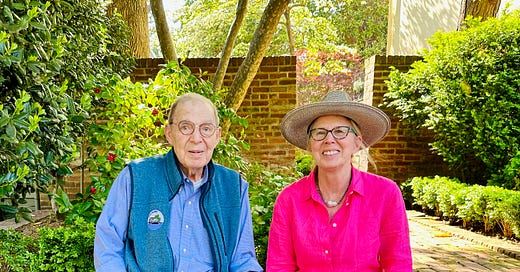Please don't say "Sorry for your loss"
A complicated relationship with my dad has led to complicated grief.
This is one in a series of very personal essays on what getting old is really like, from the blessings to the bullshit. If my writing resonates with you, I’d love to have you as a paid subscriber. Your support helps me continue the work of writing that matters, to me and to you.
Last week, readers offered condolences on the news that my 93-year-old dad had died after a long decline. How odd, I thought: aren’t readers interested in my other big news1, that my podcast is ending after five years and (ta da) I’ve been writing on Substack for exactly one year?
This is what denial feels like
Several days went by; then came a glimmer of understanding. I had failed to acknowledge the loss of my dad—to readers, who understood it right away, or to myself. Somehow his death seemed less dramatic to me because he declined so slowly and over a period of 15 months. Now, several weeks later, I’m just starting to feel this life-changing loss. Why did it take me so long?
Well, it’s complicated.
I understand that grief is complicated when the relationship with that person is complicated. So it is for me with my dad. It was a relief to see my dad released to the hereafter2 after a long period of debilitation. It provided closure, I thought, and peace for him. But despite loving my father very much, I’m not feeling the sadness we associate with grief. Instead I’m feeling a bit numb, confused, guilty, and even fearful.
![[B]OLD AGE with Debbie Weil](https://substackcdn.com/image/fetch/$s_!i8Z0!,w_80,h_80,c_fill,f_auto,q_auto:good,fl_progressive:steep,g_auto/https%3A%2F%2Fsubstack-post-media.s3.amazonaws.com%2Fpublic%2Fimages%2Fdaaca764-d8d6-4a1b-bf58-61dbb72810fc_842x842.png)
![[B]OLD AGE with Debbie Weil](https://substackcdn.com/image/fetch/$s_!fEcd!,e_trim:10:white/e_trim:10:transparent/h_72,c_limit,f_auto,q_auto:good,fl_progressive:steep/https%3A%2F%2Fsubstack-post-media.s3.amazonaws.com%2Fpublic%2Fimages%2F95ad4442-e435-4ebc-a8d2-9c9b89a8bdb6_2100x400.png)

![[B]OLD AGE with Debbie Weil](https://substackcdn.com/image/fetch/$s_!i8Z0!,w_36,h_36,c_fill,f_auto,q_auto:good,fl_progressive:steep,g_auto/https%3A%2F%2Fsubstack-post-media.s3.amazonaws.com%2Fpublic%2Fimages%2Fdaaca764-d8d6-4a1b-bf58-61dbb72810fc_842x842.png)
